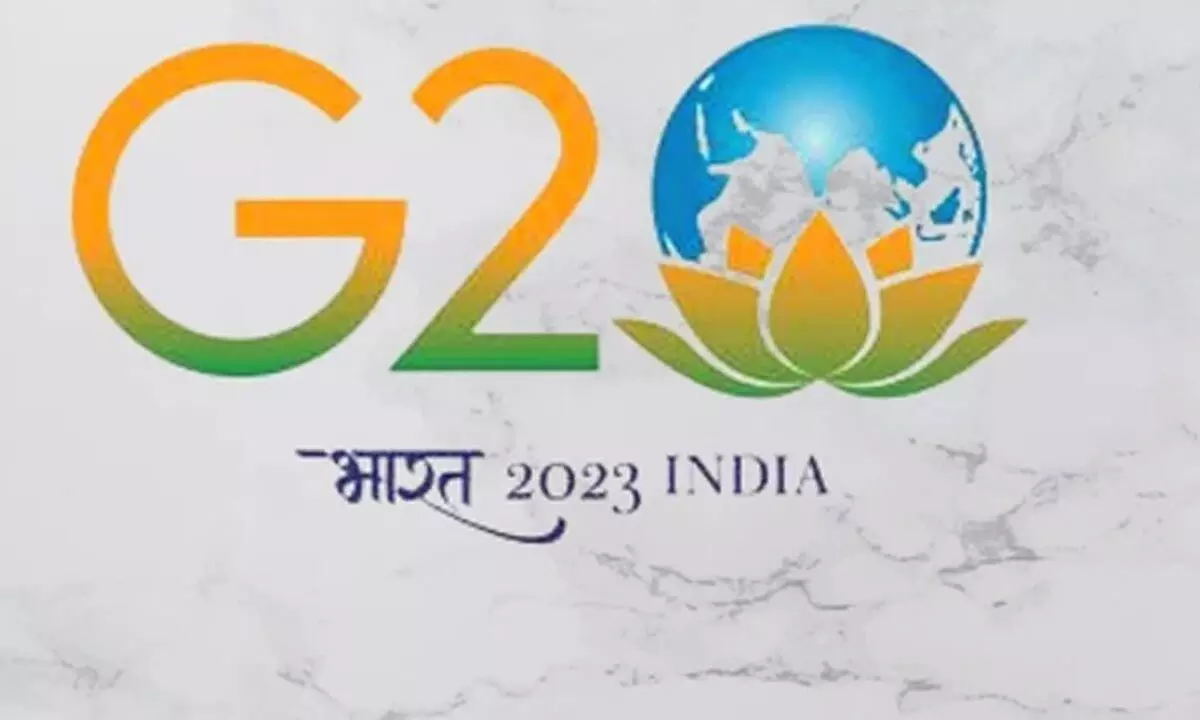Live
- HDFC Bank to support underserved women borrowers
- Q4 boost buoys bourses
- KIMS docs successfully perform high-risk surgery on heart patient
- India Inc vulnerable to sensitive data: Report
- Four people killed in a fatal road accident in Anantapur district
- Citroen to supply 1000 e-C3 EVs to OHM E Logistics
- India keen on Atmanirbharta in mfg space: Sitharaman
- NSS volunteers plant saplings in Dommeru
- 24x7 three-tier security in place at strong rooms
- Fish Prasadam to be distributed from June 8 at Exhibition Grounds in Hyderabad"
Just In
Cultural heritage both pillar of past and pathway to future: Reddy at G20 ministerial meeting By Kunal Dutt

Each of the four priorities for culture, articulated under India's G20 presidency, are a "piece of a larger puzzle" that forms a picture in which cultural heritage is both a pillar of the past and a pathway to the future, Union Minister G Kishan Reddy said on Saturday
Varanasi: Each of the four priorities for culture, articulated under India's G20 presidency, are a "piece of a larger puzzle" that forms a picture in which cultural heritage is both a pillar of the past and a pathway to the future, Union Minister G Kishan Reddy said on Saturday. Addressing ministers and other delegates at the G20 Culture Ministers' Meeting in Varanasi, he also said that the discussions and deliberations that have taken place as a part of the Culture Working Group meeting and the Global Thematic Webinars have been "remarkable and inspiring".
The Culture Ministers' Meeting aims to catalyse collective actions for accelerating progress" on the four priority areas for culture. These are protection and restitution of cultural property, harnessing living heritage for a sustainable future, promotion of cultural and creative industries and creative economy, and leveraging digital technologies for the protection and promotion of culture.
"Each of these priorities are a piece of a larger puzzle, one that forms a picture where cultural heritage is both a pillar of the past and a pathway to the future," Reddy said in his address. The Union minister holds the portfolios of Culture, Tourism and Development of the North East Region (DoNER). "We've progressed from identifying and deliberating the four priorities to advance towards the action-oriented outcomes that would be a significant step in placing culture at the heart of global policymaking," he said. The meeting comes ahead of the G20 Summit, scheduled to be held on September 9 and 10 in Delhi.
The Culture Working Group's (CWG) first meeting was held in Khajuraho in Madhya Pradesh, followed by two more in Odisha's Bhubaneswar and Hampi in Karnataka. The fourth and the last meeting of the CWG was held from August 24-25, which culminated with the ministerial meeting here on Saturday. "I am filled with immense pride as I address the Culture Ministers' Meeting under India's G20 presidency here in this beautiful city of Varanasi. As one of the world's oldest continuously living cities, Varanasi stands as a testament to India's rich cultural heritage," the Union culture minister said. Being the spiritual heart of India, Varanasi is a symbol of India's rich cultural heritage, dating back to several thousands of years, he said and welcomed delegates. "As the eternal city by the Ganges, Varanasi captures the confluence of culture, arts, and traditions, making it a fitting backdrop for this meeting," Reddy said. The Union minister said in a world rich with diversity, "our shared cultural heritage is the thread that binds us all" and "allows us to acknowledge and respect our differences, while celebrating humanity". Reddy said culture is much more than a geographic or social differentiator. "It is the unique and vibrant expression of our experiences, comprising the customs, values, languages, and arts that define us," he said.
This journey of the G20 Culture Working Group has been "inclusive and collaborative" and has brought "us to this pivotal moment in our timeline – the Culture Ministers' Meeting", Reddy said. In 2020, under Saudi Arabia's presidency, the G20 recognised culture's integral role, especially when the Covid pandemic revealed the sector's weakness. The following year, Italy championed the cause, leading to the historic 'Rome Declaration' at the inaugural G20 Culture Ministers' Meeting, the Union minister said. Emphasising culture's crucial role in sustainable development and climate change solutions, Indonesia took this agenda forward in 2022 with the 'Bali Leaders Declaration', which "reaffirmed the significance of culture as an enabler and driver of sustainable development", he said.
"Today, we commit to nurturing and expanding this vision, recognising the transformative power of culture," Reddy emphasised and praised the "invaluable contributions" made by G20 members He said he useful insights, comments, and feedback offered by members have greatly enriched the shared dialogue. In drafting the Culture Minister's Declaration, the CWG carefully considered the "insights and feedback from members, building on what we achieved in the Rome and Bali Declarations," he added. Under India's presidency, "we have tried to capture not just the letter but, most importantly, the spirit of our collective vision," the minister asserted.
A special postage stamp on the 'Culture Unites All' campaign under the culture track of the G20 and a report consolidating the best practices and the insights from the Global Thematic Webinars, titled 'G20 Culture: Shaping the Global Narrative for Inclusive Growth', are to be released on Saturday. Reddy said the report stands as a "pivotal achievement of India's G20 Presidency". "We have the capability to make culture a strong pillar of mutual understanding and promote international collaboration and harmony. This is how it brings us all closer, in its unique way, weaving an intricate web of humanity, and shaping a society that is more inclusive, forward-thinking and richly diverse," he said.

© 2024 Hyderabad Media House Limited/The Hans India. All rights reserved. Powered by hocalwire.com






